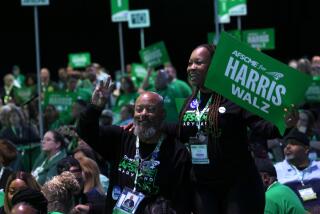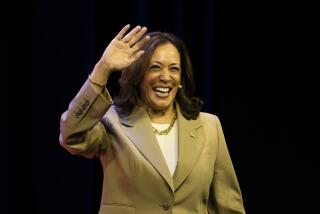THE TIMES POLL : Clinton’s Job Approval Rating Stands at 55%
WASHINGTON — As he prepares to deliver his second State of the Union Address Tuesday evening, President Clinton enjoys broad but still qualified approval of his performance in office, a Times Poll has found.
Despite several weeks of allegations of personal and financial misbehavior in Arkansas, Clinton’s job approval rating in the new survey stands at 55%--unchanged from a Times Poll taken in early December before the controversies emerged.
Public sentiment remains uncertain about Clinton’s investment in an Arkansas real estate venture with the owner of a failed savings and loan: Close to three-quarters of those surveyed said they don’t know enough about the Whitewater Development Corp. controversy to determine whether the President and First Lady Hillary Rodham Clinton did anything wrong.
So far, respondents were inclined to give him the benefit of the doubt: The share of respondents who said Clinton lacks the honesty and integrity to serve as President had inched up only slightly since December, remaining just below 30%.
But on the broadest assessment of Clinton’s effect on the nation, most respondents remained to be persuaded. Asked if “the country is in better shape because of Bill Clinton’s performance in office this past year,” 30% said yes, 15% said no, and 51% said he has made little difference.
Moreover, the poll indicates that Americans continue to give higher priority to reduction of the federal budget deficit than to the public investment agenda that Clinton hopes to invigorate this year. And, like critics of Clinton’s ambitious reform plan, most respondents said they want government to move slowly in remaking the health care system.
Still, after his early stumbles, Clinton has recovered enough public esteem to rank in the mid-range of job approval ratings of recent presidents at the one-year mark. Clinton’s first-anniversary approval rating is above Ronald Reagan’s and Harry S. Truman’s, equal to Jimmy Carter’s, just below Lyndon B. Johnson’s, and well beneath the 70%-plus readings achieved by John F. Kennedy, Dwight D. Eisenhower and George Bush, according to Gallup polls.
The Times Poll, supervised by John Brennan, surveyed 1,516 adults nationwide Jan. 15-19; it has a margin of sampling error of plus or minus 3 percentage points.
The poll found a strengthening breeze of optimism about the economy. About 37% of those polled said the nation is no longer in recession--the highest figure recorded since The Times Poll began asking the question in that form in 1991. About one out of five respondents said the economy remains mired in “serious” recession--the lowest figure since March, 1991, and less than half the percentage recorded in the months before Clinton’s election.
One out of four respondents expected the economy to improve over the next three months, while just one out of eight expected it to slip--the most positive ratio since last January. Likewise, 28% of those surveyed said they expect the unemployment situation to improve over the next three months, while 18% said they expect it to deteriorate; the 10-point positive balance is the most optimistic since February.
Most analysts said they believe that the economic numbers foreshadow continued high performance ratings for Clinton. “He can claim ownership of the economy now,” said Karlyn H. Bowman, a senior fellow at the conservative American Enterprise Institute. “If the economy continues to do well through this year, I think he will stay in that 55-60% range.”
Asked specifically about the economy, respondents said that they approve of Clinton’s performance by a margin of 48% to 40%. In the wake of his tour across Europe and the nations of the former Soviet Union, respondents said they approve of his performance in foreign affairs by a 51%-33% margin, equaling his strongest showing in office.
The best news for Clinton is the extent of his inroads among groups that previously had reacted coolly to him and that had resisted Democratic presidential nominees for most of the past quarter-century.
Although Clinton’s job rating among respondents earning less than $20,000 annually has hardly changed since June, for instance, his positive marks have doubled among the most affluent.
The President now receives positive job ratings from three-fifths of college graduates and self-described moderates, nearly three-fifths of suburbanites and those earning more than $60,000 annually, and a majority of both whites and independents. Exactly half of white non-Catholic Christians give him positive marks.
Among those who voted for Bush in 1992, roughly 3 in 10 now give Clinton positive job ratings; those who backed Ross Perot in 1992 now split evenly, with 47% approving of Clinton’s performance and 48% disapproving. Those numbers constitute an improvement since summer, when only 9% of Bush backers and 41% of Perot voters applauded Clinton’s performance.
Clinton’s position is solid on another measure: 57% of those polled, including 43% of those who backed Perot, said he is “working hard to bring fundamental change.” Just 35%--down 6 percentage points from December--said he represents “business as usual.”
But those who credit Clinton with change are divided on its effect: 43% said he has improved conditions in the nation, 9% said he has made things worse and 45% said they see no difference. Not surprisingly, the roughly one-third of respondents who said Clinton represents business as usual hold a significantly more negative assessment: Just 10% said things are better because of his year in office, 23% said conditions are worse, and 63% said he has had no effect.
Other warning signs for the President appear in the survey. One is the disparity in intensity between his supporters and critics: Although his overall approval rating is quite positive, the percentage of respondents who are strongly negative about his performance equals those who are strongly in favor: one out of five.
Likewise, 25% of respondents said they definitely won’t vote for Clinton in 1996; just 13% said they are certain to support him. Those numbers may not predict how people will actually vote almost three years hence, but they are another reflection of the relative intensity that Clinton inspires in supporters and opponents.
Most respondents have so far withheld judgment on the tangled questions raised by the Clintons’ investment in a failed Arkansas land development deal. Asked if the President and his wife had “engaged in wrongdoing” in the Whitewater venture, which involved the development of resort property in the Ozark Mountains, just 13% said yes, 15% said no and 72% said they don’t know.
Attitudes toward Hillary Clinton have changed only slightly since December, with 56% expressing a favorable opinion and 25% negative. Asked if Bill Clinton has the honesty and integrity to serve as President, 63% said yes and 29% said no--only a small change from the 68%-23% split in December.
Similarly, three-fourths of those surveyed said the Whitewater controversy hasn’t affected their opinion of Clinton. One-fifth said it has diminished their assessment, but most of those voted for Bush in 1992. Respondents were ambivalent on whether the Clintons are cooperating sufficiently with the investigation: Half said yes, but one-fourth disagreed and the rest were unsure.
The poll also signals ambivalence on policy questions: Respondents broadly shared Clinton’s priorities but weren’t certain about his prescriptions. Asked in an open-ended question to say what issues Clinton should focus on this year, respondents echoed the President’s own list: 53% cited the economy, 26% health care and 22% crime, drugs and gun control. Another 8% picked the questions of moral and cultural values that Clinton has lately emphasized.
But the poll shows that in many areas Clinton still must strain to convert Americans to his solutions. Asked to define the government’s top economic priority, just 27% called for boosting government spending on education, public works and research--the investment agenda Clinton hopes to revive this year after largely deferring it in 1993. Deficit-reduction remained the priority for 35%, while 21% put tax cuts at the top of the list.
On health care, Clinton’s plan still receives tentative approval: 47% said they generally approved of the plan, while 32% said they didn’t like it. But those numbers have slipped since Clinton introduced the plan in September, when supporters exceeded critics by 30 percentage points.
Another flashing yellow light: 55% of those polled accepted the argument of Clinton’s critics that changes in the health care system should be phased in over time; just 40% said reform should be implemented “as quickly as possible.”
On crime, Clinton could be in a stronger position. Nearly three-fifths of respondents said they support the Administration’s plan to raise fees for gun dealers; a similar majority said they endorse increased taxes on ammunition.
THE TIMES POLL: Clinton Holding at 55% Approval
After one year in office, 55% of respondents say they approve of the way President Clinton is handling his job. That’s unchanged from five weeks ago, indicating allegations of wrongdoing against the President have so far had little on his standing.
Clinton approval rating: Jan. ‘94: 55% Dec. ‘93: 55% Sept. ‘93: 53% June ‘93: 42% Feb. ‘93: 58% *
Do you think the country is in better shape because of Bill Clinton’s performance in office this past year? Better: 30% Worse: 15% No Difference: 51% Don’t know: 4% *
How has the Clintons’ involvement in the Whitewater real estate case made you feel toward Bill Clinton? More favorably: 1% Less favorably: 20% No effect: 74% Don’t know: 5% *
What is your impression of Hillary Rodham Clinton?
Jan. ’94 Dec. ’93 Favorable 56% 55% Unfavorable 25% 21% Don’t know 19% 24%
*
Do you think we are in an economic recession?
Jan. ’94 Dec. ’93 No recession 55% 46% Moderate recession 40% 49% Don’t know 5% 5%
HOW THE POLL WAS CONDUCTED: The Times Poll interviewed 1,516 adult Americans nationwide, by telephone, from Jan. 15 through 19. Telephone numbers were chosen from a list of all exchanges in the nation. Random-digit dialing techniques were used so that listed and non-listed numbers could be contacted. Interviewing was conducted in English and Spanish. Results were weighted slightly to conform with census figures for sex, race, age, education and labor force participation. The margin of sampling error on the total sample is plus or minus 3 percentage points. For other subgroups the error margin may be somewhat higher. Poll results can also be affected by other factors such as question wording and the order in which questions are presented.
More to Read
Get the L.A. Times Politics newsletter
Deeply reported insights into legislation, politics and policy from Sacramento, Washington and beyond. In your inbox three times per week.
You may occasionally receive promotional content from the Los Angeles Times.










